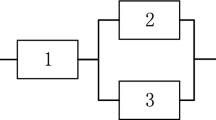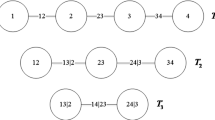Abstract
In order to accurately calculate the reliability of mechanical components and systems with multiple correlated failure modes and to reduce the computational complexity of these calculations, the Copula function is used to represent related structures among failure modes. Based on a correlation analysis of the failure modes of parts of a system, a life distribution model of components is constructed using the Copula function. The type of Copula model was initially selected using a binary frequency histogram of the life empirical distribution between the two components. The unknown parameters in the Copula model were estimated using the maximum likelihood estimation method and the most suitable Copula model was determined by calculating the square Euclidean distance. The reliability of series, parallel, and series–parallel systems was analyzed based on the Copula function, where life was used as a variable to measure the correlation between components. Thus, a reliability model of a system with life correlations was established. Reliability calculation of a particular diesel crank and connecting rod mechanism was taken as a practical example to illustrate the feasibility of the proposed method.








Similar content being viewed by others
References
Adduri, P. R., & Penmetsa, R. C. (2007). Bounds on structural system reliability in the presence of interval variables. Computers and Structures, 85(5–6), 320–329.
An, H., Yin, H., & He, F. K. (2016). Analysis and application of mechanical system reliability model based on Copula function. Polish Maritime Research, 23(s1), 187–191.
Barrera, J., Cancela, H., & Moreno, E. (2015). Topological optimization of reliable networks under dependent failures. Operations Research Letters, 43(2), 132–136.
Ditlevsen, O. (1982). System reliability bounding by conditioning. Journal of the Engineering Mechanics Division, 108(5), 708–716.
Eryilmaz, S. (2014). Multivariate copula based dynamic reliability modeling with application to weighted k-out-of-n systems of dependent components. Structural Safety, 51, 23–28.
Guo, C., Wang, W., Guo, B., & Peng, R. (2013). Maintenance optimization for systems with dependent competing risks using a copula function. Eksploatacja I Niezawodnosc: Maintenance and Reliability, 15(1), 9–17.
Jiang, C., Zhang, W., & Han, X. (2017). A Copula function based evidence theory model for correlation analysis and corresponding structural reliability method. Journal of Mechanical Engineering, 53(16), 199–209.
Li, C. P., & Hao, H. B. (2016). A copula-based degradation modeling and reliability assessment. Engineering Letters, 24(3), 295–300.
Li, H., Huang, H. Z., Li, Y. F., Zhou, J., & Mi, J. (2018). Physics of failure-based reliability prediction of turbine blades using multi-source information fusion. Applied Soft Computing, 72, 624–635.
Li, X. Y., Liu, Y., Chen, C. J., & Jiang, T. (2015a). A copula-based reliability modeling for nonrepairable multi-state k-out-of-n systems with dependent components. Proceedings of the Institution of Mechanical Engineers, Part O: Journal of Risk and Reliability, 230(2), 133–146.
Li, Y. F., Mi, J., Liu, Y., Yang, Y. J., & Huang, H. Z. (2015b). Dynamic fault tree analysis based on continuous-time Bayesian networks under fuzzy numbers. Proceedings of the Institution of Mechanical Engineers, Part O, Journal of Risk and Reliability, 229(6), 530–541.
Lu, H., & Zhu, Z. C. (2018). A method for estimating the reliability of structural systems with moment-matching and copula concept. Mechanics Based Design of Structures and Machines, 46(2), 196–208.
Mi, J., Li, Y. F., Peng, W., & Huang, H. Z. (2018). Reliability analysis of complex multi-state system with common cause failure based on evidential networks. Reliability Engineering and System Safety, 174, 71–81.
Mi, J., Li, Y. F., Yang, Y. J., Peng, W., & Huang, H. Z. (2016). Reliability assessment of complex electromechanical systems under epistemic uncertainty. Reliability Engineering and System Safety, 152, 1–15.
Nelsen, R. B. (2006). An introduction to Copulas. New York: Springer.
Park, C., Kim, N. H., & Haftka, R. T. (2015). The effect of ignoring dependence between failure modes on evaluating system reliability. Structural and Multidisciplinary Optimization, 52(2), 251–268.
Peng, W., Zhang, X. L., & Huang, H. Z. (2016). A failure rate interaction model for two-component systems based on copula function. Proceedings of the Institution of Mechanical Engineers, Part O: Journal of Risk and Reliability, 230(3), 278–284.
Qi, G., & Yang, G. (2015). Maintenance interval decision models for a system with failure interaction. Journal of Manufacturing Systems, 36, 109–114.
Stern, R. E., Song, J., & Work, D. B. (2017). Accelerated Monte Carlo system reliability analysis through machine-learning-based surrogate models of network connectivity. Reliability Engineering and System Safety, 164, 1–9.
Tang, X. S., Li, D. Q., & Zhou, C. B. (2015). Copula-based approaches for evaluating slope reliability under incomplete probability information. Structural Safety, 52, 90–99.
Wu, Z., Chen, J., & Wen, B. (2006). A new narrow-bound method for computing system failure probability. In Proceedings of geoshanghai international conference, pp. 98–102.
Xiao, N. C., Huang, H. Z., Wang, Z., Li, Y., & Liu, Y. (2012). Reliability analysis of series systems with multiple failure modes under epistemic and aleatory uncertainties. Proceedings of the Institution of Mechanical Engineers, Part O: Journal of Risk and Reliability, 226(3), 295–304.
Yu, S., & Wang, Z. L. (2018). A novel time-variant reliability analysis method based on failure processes decomposition for dynamic uncertain structures. ASME Journal of Mechanical Design, 140(5), 051401.
Yu, S., Wang, Z. L., & Meng, D. B. (2018). Time-variant reliability assessment for multiple failure modes and temporal parameters. Structural and Multidisciplinary Optimization, 58(4), 1705–1717.
Zhang, X., & Alyson, W. (2017). System reliability and component importance under dependence: a Copula approach. Technometrics, 59(2), 215–224.
Zhang, X., Gao, H., Huang, H. Z., Li, Y. F., & Mi, J. (2018). Dynamic reliability modeling for system analysis under complex load. Reliability Engineering and System Safety, 180, 345–351.
Zhang, Y., & Lee, L. J. S. (2016). A copula approach in the point estimate method for reliability engineering. Quality and Reliability Engineering International, 32(4), 1501–1508.
Zhang, X. P., Shang, J. Z., Chen, X., Zhang, C. H., & Wang, Y. S. (2014). Statistical inference of accelerated life testing with dependent competing failures based on copula theory. IEEE Transactions on Reliability, 63(3), 764–780.
Zhou, J. Y., Xie, L. Y., & Qian, W. X. (2008). Reliability analysis on structural systems with load dependency. Chinese Journal of Mechanical Engineering, 44(5), 45–50.
Acknowledgements
This research was partially supported by the National Natural Science Foundation of China under the Contract Number 61463021, the Natural Science Foundation of Jiangxi Province under the Contract Number 20181BAB202020, and the Young Scientists Object Program of Jiangxi Province, China under the Contract Number 20144BCB23037.
Author information
Authors and Affiliations
Corresponding author
Additional information
Publisher's Note
Springer Nature remains neutral with regard to jurisdictional claims in published maps and institutional affiliations.
Rights and permissions
About this article
Cite this article
Gu, YK., Fan, CJ., Liang, LQ. et al. Reliability calculation method based on the Copula function for mechanical systems with dependent failure. Ann Oper Res 311, 99–116 (2022). https://doi.org/10.1007/s10479-019-03202-5
Published:
Issue Date:
DOI: https://doi.org/10.1007/s10479-019-03202-5




